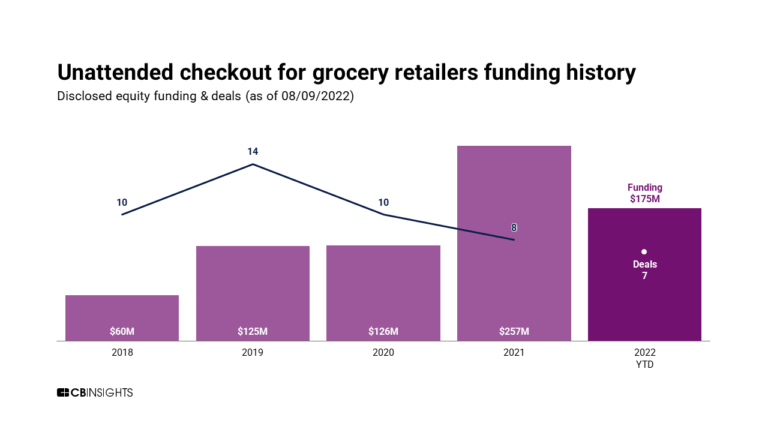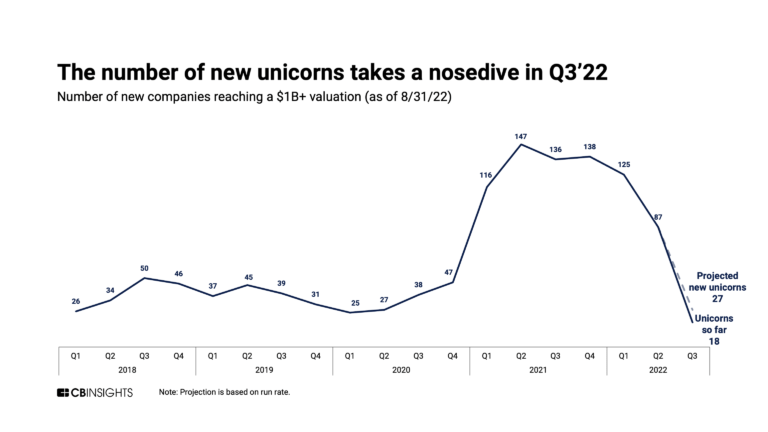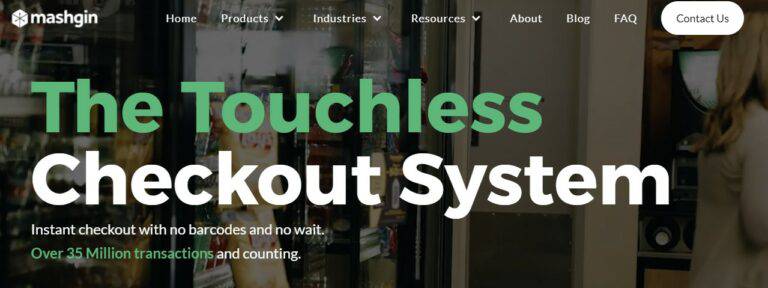
Mashgin
Founded Year
2014Stage
Series B | AliveTotal Raised
$62.67MValuation
$0000Last Raised
$62.5M | 2 yrs agoMosaic Score The Mosaic Score is an algorithm that measures the overall financial health and market potential of private companies.
-26 points in the past 30 days
About Mashgin
Mashgin is a company specializing in AI-powered self-checkout systems within the retail automation sector. Their main product leverages 3D vision and deep learning algorithms to recognize items quickly and accurately, aiming to enhance the checkout process by reducing transaction times and increasing retailer revenue. Mashgin's technology is utilized across various sectors including convenience stores, sports and entertainment venues, and business dining facilities. It was founded in 2014 and is based in Palo Alto, California.
Loading...
Mashgin's Product Videos

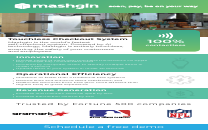
ESPs containing Mashgin
The ESP matrix leverages data and analyst insight to identify and rank leading companies in a given technology landscape.
The unattended checkout market offers a range of solutions to retailers looking to provide unmanned point-of-sale and checkout technology. Solutions involve the deployment of kiosks, mobile applications, and computer vision technology to facilitate a seamless and contactless checkout experience for customers. This market is driven by the increasing demand for convenient and efficient shopping expe…
Mashgin named as Leader among 15 other companies, including Amazon, AiFi, and MishiPay.
Mashgin's Products & Differentiators
Mashgin Touchless Checkout System
Mashgin is the world's fastest self-checkout system. It leverages computer vision to identify items presented from virtually any angle and instantly ring them up in a single transaction. It doesn’t need barcodes or RFIDs, perfectly consistent packaging, or particular orientations to work correctly. Consumers simply place their items down, pay, and go--in less than 10 seconds. Mashgin instantly identifies packaged goods, produce, and open plated food items (e.g., an apple or piece of fruit, salad, combo meal plate, etc.). Its patented technology has the ability to recognize any number of items simultaneously and in any orientation in which they are presented.
Loading...
Research containing Mashgin
Get data-driven expert analysis from the CB Insights Intelligence Unit.
CB Insights Intelligence Analysts have mentioned Mashgin in 5 CB Insights research briefs, most recently on Mar 14, 2023.
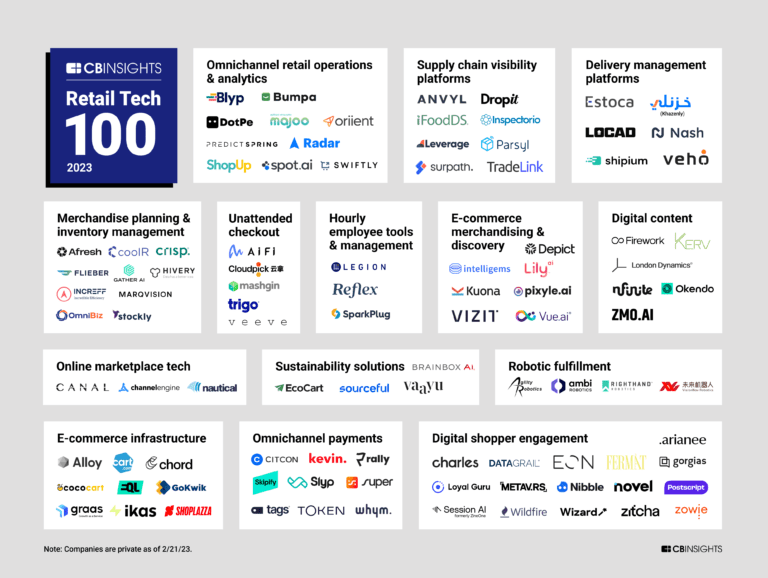
Mar 14, 2023 report
Retail Tech 100: The most promising retail tech startups of 2023Expert Collections containing Mashgin
Expert Collections are analyst-curated lists that highlight the companies you need to know in the most important technology spaces.
Mashgin is included in 7 Expert Collections, including Restaurant Tech.
Restaurant Tech
1,075 items
Hardware and software for restaurant management, bookings, staffing, mobile restaurant payments, inventory management, cloud kitchens, and more. On-demand food delivery services are excluded from this collection.
Store tech (In-store retail tech)
2,063 items
Companies that make tech solutions to enable brick-and-mortar retail store operations.
Unicorns- Billion Dollar Startups
1,244 items
Grocery Retail Tech
831 items
Startups providing B2B solutions to grocery businesses to improve their store and omni-channel performance. Includes customer analytics platforms, in-store robots, predictive inventory management systems, online enablement for grocers and consumables retailers, and more.
Artificial Intelligence
14,769 items
Companies developing artificial intelligence solutions, including cross-industry applications, industry-specific products, and AI infrastructure solutions.
New Retail Formats
368 items
Tech-enabled, physical retail selling formats that reach beyond the walls of a traditional store.
Mashgin Patents
Mashgin has filed 20 patents.
The 3 most popular patent topics include:
- computer vision
- 3d imaging
- image processing

Application Date | Grant Date | Title | Related Topics | Status |
|---|---|---|---|---|
5/18/2021 | 6/4/2024 | Visual system, Pseudoscience, Psychometrics, Vision, Cerebellum | Grant |
Application Date | 5/18/2021 |
|---|---|
Grant Date | 6/4/2024 |
Title | |
Related Topics | Visual system, Pseudoscience, Psychometrics, Vision, Cerebellum |
Status | Grant |
Latest Mashgin News
Jun 7, 2024
Self-checkout kiosks, computer vision and autonomous are part of the checkout evolution. Tammy Mastroberte NATIONAL REPORT — Contactless checkout in stores is becoming more and more common for consumers today — and in many cases, even expected. Whether it's at a grocery store, convenience store, drugstore or specialty store, a variety of self-checkout options are helping customers move through the payment process faster and helping retailers improve efficiency and reallocate labor. "Thanks to big-box and grocery, we have seen a much improved customer acceptance of the self-checkout," said Steve Morris, owner and president of Retail Management Inc., based in St. Paul, Minn., and operating 16 convenience stores. "The barrier for teaching customers about it and the apprehension is largely overcome thanks to the big-boxes. COVID put contactless on steroids and that acceptance is a normal part of our society now." From the customer perspective, the desire is to increase the speed of checking out and leaving the store. In the convenience channel, with items that need age checks and the sale of lottery, waiting in line can become an issue. Contactless options such self-checkout and mobile payment can make a big difference in customer satisfaction. Advertisement - article continues below Advertisement "It's all about speed. Customers don't really like waiting in line," said Jack Hogan, senior vice president of Mashgin, a Palo Alto, Calif.-based supplier of artificial intelligence (AI) based self-checkout technology in use at convenience store chains such as Circle K, ampm, Refuel and Chestnut Markets. "In a c-store environment when the lottery is up to $1 billion and you have people waiting in line that just want a Red Bull, they don't want to wait." From the retailer perspective, in addition to improved customer satisfaction, contactless checkout enables c-store operators to improve labor efficiency and utilize employees for other store tasks rather than them being stuck behind the checkout counter, according to Morris. "It's not a labor savings; it's just labor moving where they can do things in the store that were not getting done with the labor shortage issues," he noted. Choosing the Right Solution Chestnut Markets, the operator of 75 c-store locations, is in the process of rolling out Mashgin self-checkout technology at some of its stores. This technology uses cameras and AI to scan items instantly, including foodservice items, without the need for a barcode. A customer places their items in a group on the kiosk base, the cameras recognize and total them, and then the customer can pay with cash, card, Apple Pay or other payment forms. "We chose to add self-checkout to drive efficiency in our site and give options for customers to check out faster," said Faheem Jamal, director of c-store operations for the New Paltz, N.Y.-based chain. "We did extensive research into all self-checkouts and Mashgin was hands down the fastest option out there. It can distinguish between hot dogs and other roller grill items, a doughnut vs. a Danish, and can tell if you have a regular Coke or a Coke Zero." Chestnut Markets is in the process of rolling out the technology to several stores. The first store that went live has four traditional checkouts and six Mashgin checkouts, along with one "dedicated customer service specialist on each side of the store" to help customers with the self-checkout process as needed, according to Jamal. "We offer customer service specialists because customer service is so important and we don't want that part of our business model to go away because of self-checkout," he said. Circle K, the global c-store banner of Alimentation Couche-Tard Inc., has also reported success with Mashgin's technology, with kiosks deployed at 2,200 locations. In September 2023, Couche-Tard announced that 40% of its transactions were run through the self-checkout option, with some locations processing more than 50% of transactions. "The equipment makes payment faster and easier for our customers, as well as making it easier for our store team members to focus on serving them," Couche-Tard President and CEO Brian Hannasch said in a statement at the time. For smaller retailers, self-checkout technology is now available at price points they can afford and as a result, more are embracing the option. Retail Management Inc. selected Gilbarco Passport self-checkout because of the existing point-of-sale (POS) in its stores. "Self-checkout is no longer cost prohibitive," said Morris. Another contactless checkout option, similar to what Amazon Go stores offer, allows customers to shop the store while cameras and, in some cases, shelf sensors track what they have picked up. Then, using an app while in the store, customers simply tap their phone and leave the store, at which point they are automatically charged for their selected items. Companies such as Standard AI offer this type of technology, and the company recently acquired Skip, another self- checkout option via kiosk or mobile app that's used in many c-stores. "The traditional approach to self-checkout is now offered by all major POS companies and that is why we see more of a broad adoption," noted Stephen Liguori, cofounder and chief marking officer of Juxta, a vendor of autonomous, portable micro stores. "There are now more hybrid autonomous shopping solutions that use a mobile app to check in and computer vision that tracks what a person buys and then automatically charges them." Still, no matter what kind of self-checkout technology a retailer opts for, employee training is critical, as is making sure customers are not only aware of the technology and how to use it, but also that there are employees available to help. "I feel consumers are open to self-checkout if there is enough assistance and guidance available," said Chestnut Markets' Jamal. "With no assistance, it could be intimidating." When implementing Mashgin, Chestnut Markets' director of purchasing and merchandising underwent training with the vendor, learning how to edit items, add new items, change pricing and more. Its c-store team was also trained in how to help customers with the system. Autonomous Options Another contactless trend popping up in the c-store space is standalone autonomous stores. In January, The Army & Air Force Exchange Service (AAFES), based in Dallas, announced a plan to add fully automated, self-service stores into its network. The new stores are aimed at improving the quality of life for soldiers, airmen, guardians and Department of Defense civilians working unusual hours in high-traffic or out-of-the-way areas, according to the retailer. "A lot of commanders are approaching the Exchange to ask for unmanned retail markets to meet their communities' needs," said Air Force Chief Master Sgt. Kevin Osby, AAFES' senior enlisted advisor. "The markets can be tailor-fitted, from serving a large office building to opening a nano unit for a small location. The Exchange goes where the troops go." Last year saw ampm open an autonomous store in the main concourse of San Francisco's Chase Center, home of the Golden State Warriors; while both Choice Market , headquartered in Denver, and Golden Pantry Food Stores , based in Watkinsville, Ga., teamed up with Juxta to open their own autonomous micro retail stores. Raleigh, N.C.-based Juxta offers the Juxta Nomad, a portable, autonomous micro store with a 264-square-foot interior. Customers can either tap or swipe a credit card, debit card or mobile wallet to enter the locked store. Once inside, an AI computer vision system pairs with advanced shelf sensors to update the basket in real time. When it's time to check out, customers can review their basket at the checkout screen or just walk out. They can have a receipt sent to their phone upon leaving the store. With earlier models of autonomous stores, customers would have to trust that their items were calculated correctly, but Liguori said Juxta wanted to make sure its shoppers felt they could trust the system. Juxta customers are able to agree or disagree with the products picked up. "Until you build trust that a system works properly, it will create unease," he said. "With this system, they can check that the system got it right, and it creates trust and accelerates adoption."
Mashgin Frequently Asked Questions (FAQ)
When was Mashgin founded?
Mashgin was founded in 2014.
Where is Mashgin's headquarters?
Mashgin's headquarters is located at 849 E Charleston Road, Palo Alto.
What is Mashgin's latest funding round?
Mashgin's latest funding round is Series B.
How much did Mashgin raise?
Mashgin raised a total of $62.67M.
Who are the investors of Mashgin?
Investors of Mashgin include Y Combinator, New Enterprise Associates, Matrix Partners, Susa Ventures, Kleiner Perkins and 12 more.
Who are Mashgin's competitors?
Competitors of Mashgin include AiFi, Trigo, Boxy, Supersmart, Standard AI and 7 more.
What products does Mashgin offer?
Mashgin's products include Mashgin Touchless Checkout System.
Who are Mashgin's customers?
Customers of Mashgin include Circle K, Delek Stores, HMS Host and Denver Broncos.
Loading...
Compare Mashgin to Competitors

Grabango is a provider of checkout-free technology for the retail sector, focusing on enhancing the shopping experience in grocery and convenience stores. The company offers a solution that allows customers to shop without waiting in checkout lines by using a mobile application to scan a code and automatically tally their items. Grabango's technology is designed for large-scale store chains and aims to save shoppers time by streamlining the purchasing process. It was founded in 2016 and is based in Berkeley, California.

Standard AI operates as a company focused on transforming the retail industry through artificial intelligence. The company offers a platform that uses artificial intelligence (AI)-powered cameras and deep algorithms to provide checkout-free shopping experiences, real-time reporting on shopper behavior, and insights into inventory and stocks. Its primary services are utilized in the retail sector. It was founded in 2017 and is based in San Francisco, California.

AiFi specializes in autonomous retail technology and operates within the retail and technology sectors. The company offers computer vision solutions that enable retailers to implement frictionless shopping experiences without needing shelf sensors. It primarily sells to the retail industry, providing advanced analytics and AI-powered checkout systems to enhance the shopping experience. The company was founded in 2016 and is based in Burlingame, California.
Inokyo specializes in autonomous checkout technology for the retail sector, aiming to streamline the shopping experience. Their main offerings include a system that tracks customers' virtual carts in real-time and allows for tap and go payments, eliminating the need for traditional checkout processes. Inokyo's solutions cater to a variety of store sizes and are designed to improve operational efficiency and provide valuable customer insights. It was founded in 2018 and is based in San Francisco, California.

Zippin specializes in checkout-free technology within the retail sector. The company provides an artificial intelligence-powered platform that uses machine learning and sensor fusion technology to enable purchases. It is primarily utilized by sports and entertainment venues, airports, train stations, convenience stores, college campuses, and healthcare organizations. Zippin was formerly known as Zyp. It was founded in 2018 and is based in San Francisco, California.

SandStar is a company that focuses on smart retail solutions in the retail technology sector. The company offers intelligent vending machines, smart store analysis solutions, and visual recognition-based unmanned stores, all aimed at improving retail operational efficiency and reducing costs. SandStar primarily serves the retail industry. SandStar was formerly known as YI Tunnel. It was founded in 2016 and is based in Beijing, Beijing.
Loading...

